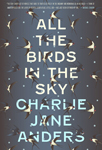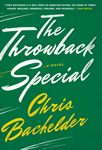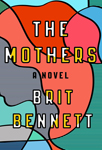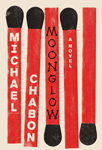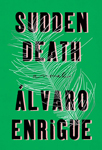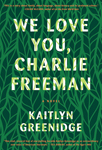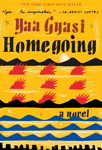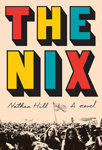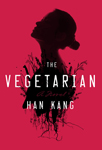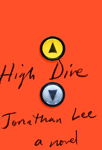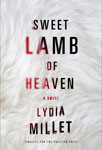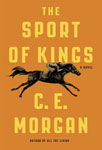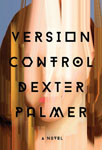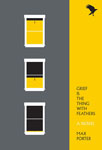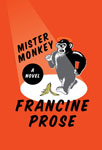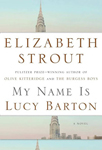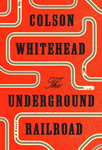by Charlie Jane Anders
Buy it at Powell’s »Reyhan Harmanci: First of all, I want to thank the Tournament of Books organizers for giving me two books, a set of instructions, and a hard deadline. All my internal clocks seem to have stopped sometime in early November, and my reading habits reduced to my claw hand gripping the phone, set to Twitter at night, and my claw hand gripping the phone, set to Twitter when I wake up. It is a terrible way to live, and to read. “Escapism” doesn’t seem to really cover the need for a portal out of this daily carnival of horrors.
Not that this particular pair of novels promise a nicer world. The Vegetarian and Homegoing are a fascinating duo to read together. They both anchor their stories in two sisters, although neither sticks with one narrator as the stories progress. Both put a lot of stock in the totemic power of dreams; both grapple with gender and power, and the limits of autonomy in “civilized” cultures. At times, for different reasons, I had to turn away from the pages. Shit gets raw.
The Vegetarian, in particular, has a horror show feeling. Written by Han Kang and first published in 2007, this translation was a long time coming, but is justly celebrated—it won the Man Booker International Prize last year. The story revolves around a woman named Yeong-hye’s sudden switch to vegetarianism—or, more accurately, her sudden disgust of meat. This refusal baffles her (horrible) husband, who arranges a visit with her sister In-hye, her sister’s husband, and her parents, which culminates in (spoiler!) her dad trying to stuff pork in her face. Yeong-hye grabs a knife, and earns herself a trip to the psych ward. And that might have been that character’s high point.
Kang’s prose is cool and flat, yet somehow communicates great emotional depth. For instance, in the third and final section, which is told from In-hye’s point of view after she has witnessed the downfall of Yeong-hye and her own marriage, she reflects on her ex-husband: “Just as she could not be sure of the source of her affection for him, or if he was really its true object, she had never been entirely sure of his feelings for her.”
The book is filled with simple observations like that, excavated from so many layers of ego, that sit on the page like tiny bombs.
The book’s three narrative points of view are Yeong-hye’s husband, In-hye’s husband, and In-hye. Yeong-hye’s own voice only comes through in bits, interludes that tell us of the violent dreams that led her away from meat, and to an increasingly psychologically fragile existence. It seems banal to say that she is mentally ill, even though she is housed full-time in a mental hospital by the end. (Although that has been a critical contention, even coming up in the comments of ToB—whether the author is eliding the issues in rendering them as mystical rather than clinical). To reduce the book to an allegory of, say, women’s roles in contemporary Korean society would also seem wrong, although the book is clear about the social constraints which tie these sisters to failing men. There’s a dark magic in The Vegetarian, unsettling in a great way.
Homegoing is also an unsettling read. It’s a first-time novel by Yaa Gyasi and you know that it’s going to be a saga when you see the family tree after the title pages. The book is as epic as The Vegetarian is minimalist, tracing eight generations from a pair of half-sisters.
Effia and Esi are born of different, neighboring tribes in Ghana—Effia is Asante, Esi part of the Fante people. It’s a satisfying story tying their fates together, so I won’t spoil it, but their paths diverge at the beginning, when Esi is sold into slavery and Effia is married to a white slave trader. From there, in alternating chapters, the stories of these two halves of a family unfurl, moving through time in small vignettes, racing closer to the current day. Homegoing’s structure makes for an incredibly immersive reading experience; when I had to put the book down at various points to leave my house, I was mad about it.
Which is not to say that Homegoing was a completely smooth reading experience. I found the first half to be more compelling than the second, with the sections devoted to life in 20th-century America having an especially cardboard quality. For instance, in one chapter we meet Sonny, the son of Hazel, whose freed slave parents raised her in Alabama. Hazel left for Harlem with baby Sonny and a man who later chooses to pass for white. Sonny’s trajectory through drug use in the inner city as an adult feels somehow obligatory, and his path to sobriety is never fully sketched out. This stands in stark contrast to, say, Abena, the daughter of a man nicknamed Unlucky who gave up a life of leisure to marry a lower-status village woman and start a family. Abena navigates life as the mistress of a childhood friend; her fortunes rise and fall by the status of the village crops. But even in a short chapter, you get the sense of her as a three-dimensional character, a woman who was raised to buck tradition.
It is hard to read Homegoing without reflecting on 2017. My claw hand and Trump’s Twitter feed were never far away, even as I happily lost myself in this multi-faceted world. The part where Jo, whose parents ran away from a plantation when he was a baby, is forced to reckon with his forged papers seemed especially relevant as we talk about a new underground railroad for undocumented immigrants. A free man living in Baltimore, Jo has a loving family and a stable life. But, as Gyasi reminds us again and again, there is no such thing as safety for black people in America.
In one scene, he prepares his kids for the new reality of a law enabling slaveowners to go to the North to retrieve their property, no matter how long since it went missing:
In the mornings before Jo and Anna went off to work, Jo made the children practice showing their papers. He would play the federal marshall, hands on his hips, walking up to each of them, even little Gracie, and saying, in a voice as stern as he could muster, “Where you goin’?” … Jo had worked hard so that his children wouldn’t have to inherit his fear, but now he wished that they had just the tiniest morsel of it.
Picking between these two novels is no easy feat. The fact that The Vegetarian made it to the Zombie Round is telling—at least three people, when I told them I was reading it (not revealing why, of course) said, “Oh I want to read that.” At times, I wondered if it was the better book, in its precise deployment of language. But if I had to press one in your hand at this moment, it’d be Homegoing. It’s the bigger book, in every sense of the word.
Match Commentary
By Kevin Guilfoile & John Warner
Kevin Guilfoile: It’s interesting that Judge Harmanci uses the words “horror show” to describe The Vegetarian. I got a similar feeling from it. It seemed like it was playing in the same sandbox of existential dread as (former Rooster competitor) Jesse Ball’s novels, and I loved The Vegetarian as much I do Ball’s work.
Han Kang builds an alternative universe not by changing the physical details of the realm, but by having nearly all her characters behave in ways that seem entirely unfamiliar. Yeong-hye makes what would be a benign choice in our world, but she does it in an odd way, and the reaction to it is strange and grows stranger. For much of the story, there is no character acting as a proxy for the reader, someone looking for answers to the same questions that are in the reader’s head (or to inform the reader what questions she should be asking). Almost no one in this book (at least for the first two-thirds) makes a decision that is strictly relatable, and as a reader the result is a feeling of being unmoored. The predictability that we require to navigate everyday life is mostly absent, it seemed to me, and it was unsettling.
John Warner: Ball is a great comparison. It’s like you’re in the world you think you recognize, and then there’s a rip in the fabric and something you not only weren’t aware of, but couldn’t conceive as being necessarily possible in the world happens. At the same time, there’s nothing supernatural at work, you’re still in the “real world,” but it’s suddenly unfamiliar.
In The Vegetarian this is also the experience of the characters, and it’s a powerful magic that sustains the feeling regardless of which character we’re tethered to at any given time. Similar to Homegoing, it’s a story where the narrative is handed off from character to character in each section. In theory this could drain the momentum, but the dread increases throughout the novel.
I don’t know that I actually enjoyed The Vegetarian in the sense that I didn’t achieve a deep connection with the characters, but it’s perhaps that lack of connection that makes the sense of alienation so powerful. I know I found the novel magnetic.
Kevin: The pulsing, tangerine-colored ball of garden mold that is Donald Trump’s head rears itself once again in the ToB. It is maddening how much this one horrible individual continues to monopolize our psychic RAM. Somehow a book’s relevance seems to depend on the degree to which it comments on Trump’s America. This depresses me, but I feel it, too.
John: It’s wearying how this motherfucker sucks up so much mental oxygen. I’d like to say we should “ignore” him, except that seems dangerous. The man is a cancer and you have to throw everything at him, but it’s exhausting, and he seems to actually relish it because he’s a monster who feeds on outrage. He’s as unsettling as The Vegetarian.
Kevin: As we have been saying, Homegoing and The Underground Railroad, written in a recent past when the present seemed impossible, feel like narratives for the moment. Novel-writing has become such a curious endeavor in this respect. These stories were conceived of and written years ago. Presumably, Gyasi and Whitehead were focused on developing timeless themes in their stories. But events have overtaken their intentions, and the political campaign of 2016 and the political realities of 2017 have focused our attention so acutely on what it means to be an American, and on who gets to say they are an American, and the bruising fight over the vision of what America (and the rest of the West) will be like going forward that it’s difficult for many of us to read through any other lens right now. And these stories seem to be especially magnified by that glass.
Given that, the meeting of these two books in tomorrow’s championship seems like it should have been entirely predictable. But if there’s anything the last year has shown it’s that I’m no better at predictions than Trump would be at the Stanford Marshmallow Experiment.
But do you care to make one now, John? Who do you think will be taking home the Rooster?
John: I have no idea, which puts me in the same class as every other predictor of things, some of whom are paid big sums to tell us who isn’t going to win a Super Bowl or presidential election. Someday I would like a job where I get to be as wrong as the average pundit.
In this case, I could see either book winning, though Whitehead has to be looked at as a marginal favorite at least. Still, I’ll go out on a limb and say that it will be Homegoing in an upset.
Kevin: I loved both of these books, but as readers we both go back a long way with Whitehead. I’m going to guess some of the judges have similarly banked goodwill toward Whitehead over the years so I will guess that will tip things his way. The only thing I know for sure is that you and I will be back here tomorrow along with all 17 ToB judges, and one of these celebrated novelists is going to take home a live rooster.
And now we turn to Rosecrans Baldwin and Andrew Womack, the ToB’s sleepless organizers, with a couple quick announcements.
Rosecrans Baldwin: Thanks, Kevin. First announcement is that we have a contest from our presenting sponsor Field Notes. The two (2) people who correctly guess how the judges will vote tomorrow, or get closest to guessing how the judges will vote tomorrow, will win a year-long subscription to Field Notes’s Quarterly Limited Editions. Huge thanks to Field Notes for their generosity.
To enter, leave a comment below by midnight Eastern with your guess for the winning book and margin of votes. For example, “Homegoing 10, The Underground Railroad 7” or “The Underground Railroad 12-5” (the total number of judges is 17). We’ll announce the winners in the commentary for Friday’s championship match. One entry per person, please.
Andrew Womack: Our second announcement comes in two parts. First, a giant thank you to everyone who took 30 seconds to become a ToB/TMN Sustaining Member. Your contribution makes a big difference in our ability to keep this thing going. Second, if you haven’t joined us, please do so now. We simply can’t continue to produce TMN and the Rooster without your financial support.
We really hope you’ve enjoyed the tournament this year. Look to this space tomorrow for details on our new ToB extension, coming in June.
Now on to the championship!



